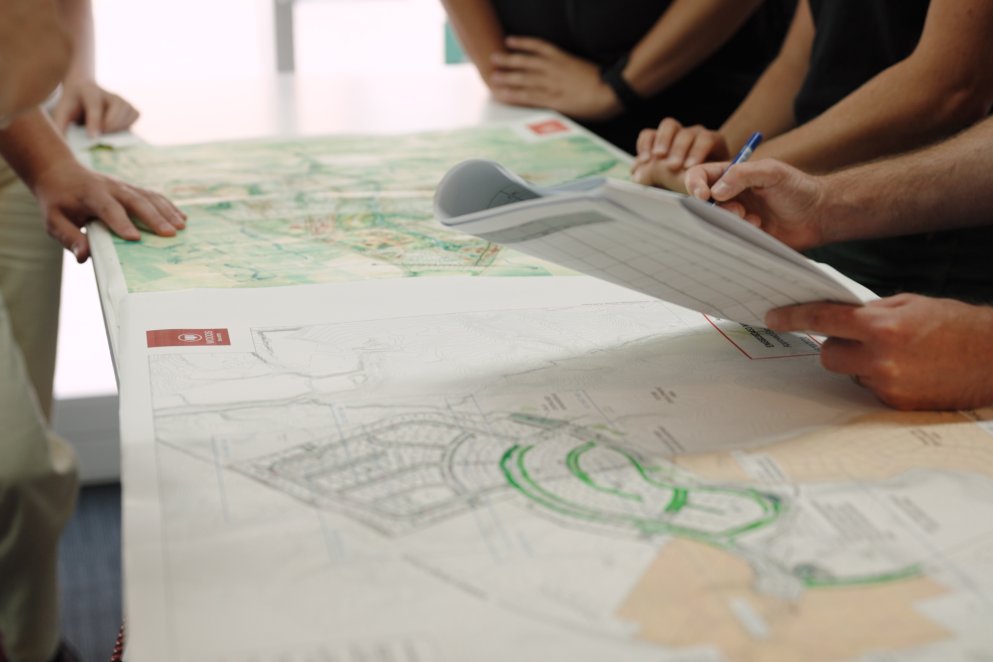What is a land development feasibility study? Why are they so important? We take a look at how feasibility studies can help reduce the risk of your development project with Woods’ Senior Urban and Architectural Designer Sean Wu.
A common mistake we see with land development projects is that many developers and landowners go straight to the concept drawing stage. In doing so, they skip the most essential and valuable stage of the process - the feasibility study. Read on to find out what you need to know about feasibility studies if you are looking to develop or purchase land.
What is a land development feasibility study?
Land development feasibility studies are used on a broad range of projects, from small to large-scale, whether it is a private, corporate, or government project.
A land development feasibility study is the process of collecting and understanding various information and assessments of the land to identify the basic parameters, opportunities, constraints, and risks of a development project.
Essentially, a feasibility study will look at the suitability of the site, what can be built on it given the local council regulatory requirements, the potential and condition of the land, and other variables that could affect the outcome of the project.
When should a feasibility study be completed?
We highly recommend that all our clients complete a feasibility study before commencing any design work for a project. It should be the first port of all when you are thinking about purchasing land for subdivision or land development, for example, as part of your pre-purchase due diligence advice. But even if you already own the land, a feasibility study is a valuable resource to understand the potential of your land or ensure any subdivision or land development project is a success.
Why is a land development feasibility study important?
Many people consider feasibility studies as an essential exercise as they reduce the risks of a project. The decisions made at the beginning of the project will have a great impact on the options you have available later.
A feasibility study allows you to understand the requirements, the constraints, the timeline, and potential obstacles before faulty design decisions are made or too much of your budget is invested in a project that is not viable.
Plus the relative cost of a feasibility study is small in the context of the overall construction cost. Particularly as it can potentially save you a lot of money in the long run.
What is the impact of a land development feasibility study?
A feasibility study can be extremely valuable if you are deciding whether or not to commission the design for a development project or identifying how to go about it and what you need to be aware of if you do go ahead.
If you have any doubts or there is controversy about aspects of a development project, a feasibility study will enable you to reassess your ideas objectively and confirm or clarify the practical and commercial viability of the land.
A feasibility study also confirms whether or not the land and/or project is likely to fulfil your objectives.
Feasibility studies: It comes down to a question of risk
The feasibility of a development project is a significant metric in measuring the risks and returns, especially when it comes to deciding whether to fund a project or not. This is true whether you are funding the project yourself or approaching the bank or a third-party lender.
In most people's minds, a failed project or a project that runs out of money part way through is much more embarrassing than a project that never starts. Similarly, when you are in the middle of a project, you very rarely have the option of just stopping there. Even if something has gone wrong, you still need to finish it despite the additional costs or rework.
That’s why we recommend spending a small amount of money upfront on a feasibility study so you can find out the risks and avoid making faulty decisions or investing in non-viable projects in the first place.
Feasibility studies at Woods
At Woods, we have worked with a variety of private, corporate, and government clients to help them navigate through these early stages of a project, determine whether there is merit in proceeding further, and determine a clear pathway forward.
Every project or opportunity is unique and typically requires different skill sets. Our wider team's experience gives our clients access to insights and knowledge across engineering planning, urban design, architecture, and basic business models to ensure that they get the best outcomes.
We’ve found the key to a successful feasibility study is curiosity and having an open mind. Although local council regulations can sometimes be quite limiting, they provide clarity around the direction a project can take and often act as a catalyst for more creative, innovative solutions. Plus it helps if you actually enjoy completing the process of fact-finding and collaboration with the client – which we do!
Sean Wu - Senior Urban and Architectural Designer
